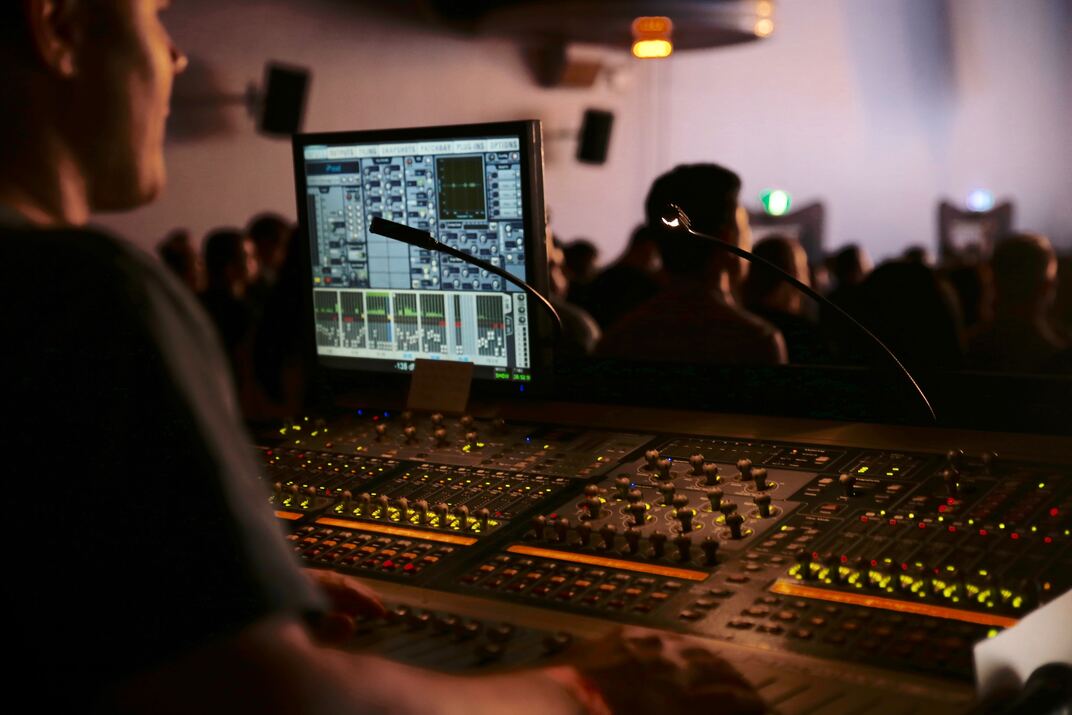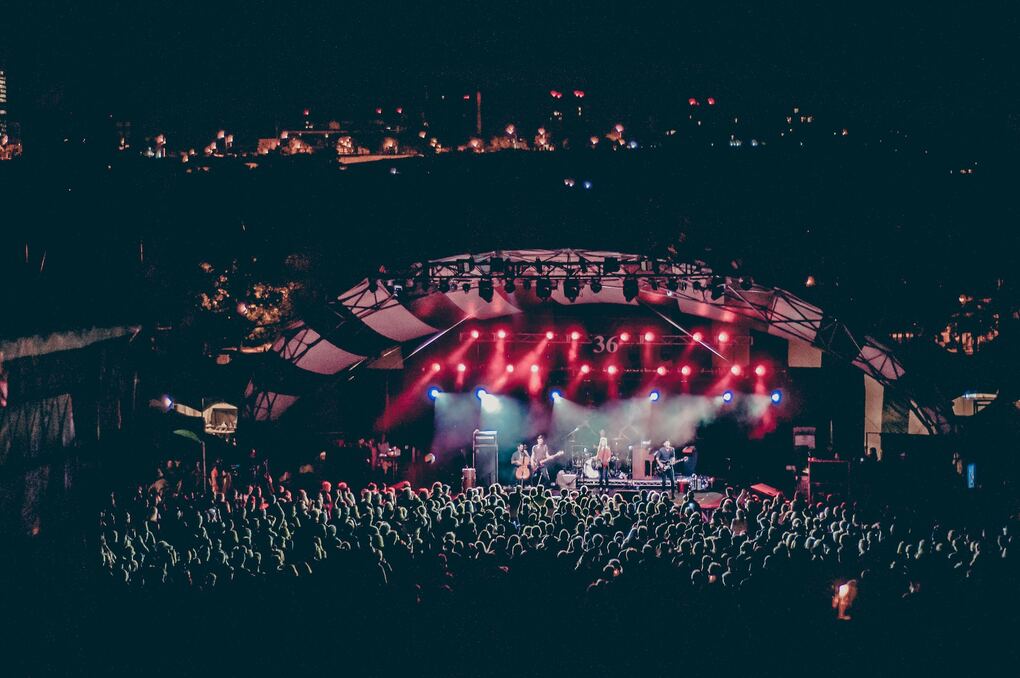How to Organise and Promote Live Music Events
Discover all you need to know to organise a successful live music event...
As a music student in London, you might have considered the prospect of organising and promoting live music events.
It's an exciting opportunity to showcase talent, build a community, and gain practical experience in today's music industry.
In our latest blog, we will walk you through the process, from the initial planning stages to promotion, selling tickets, and ensuring safety at your upcoming events here. Let's get started!
To further your knowledge on organising live events, check out our Live Event and Festival Management Course here at ICMP.
Steps to Organising a Live Music Event
Organising a live music event can seem like a daunting task, but with careful planning and a clear vision, it can be a rewarding experience. Here are the steps to begin:
1. Conceptualise the Event
The first step in organising a live music event is to determine the type of event you want to host.
Is it a concert featuring a single artist or band, a music festival with multiple acts, or a small gig in an intimate venue?
The type of event will dictate the planning process, the budget, and the promotional strategy. Take the time to envision your event and write down your ideas."
2. Budgeting
Establish a realistic budget for your event. This should include costs for the venue, artists, marketing, sound equipment, security, insurance, and other expenses. Remember to factor in a contingency amount for unexpected costs. It's better to overestimate your budget and have funds left over than to run out of money midway through planning.
3. Booking Artists
Once you have a clear idea of your event and a budget in place, it's time to start booking artists. Reach out to artists who align with your event's theme and audience. You can find a plethora of talented musicians through networking at ICMP and our Facebook pages which you will be accepted to once joining ICMP. To apply today click here.
4. Securing the Venue
The venue plays a crucial role in the success of your event. Choose a venue that suits your event's size, vibe, and technical requirements. Remember to consider factors like accessibility, facilities, and the venue's rules and regulations.
5. Event Scheduling
Plan the event's timeline, including sound checks, performances, breaks, and the end of the event. A well-planned schedule can ensure a smooth flow and a better experience for both the artists and the audience.
6. Licensing and Legal Considerations
Before you can host a music event, you may need to obtain certain licences and permits, depending on your location and the nature of the event. This could include a music licence, an alcohol licence, or a permit for hosting large gatherings. Ensure you understand the legal requirements and comply with them to avoid any issues.
Promoting Concerts and Live Music Events

Promotion is a crucial aspect of event planning. A well-promoted event can attract a larger audience, generate buzz, promote events, and increase ticket sales. Here are some tips for effective promotion:
1. Social Media
In today's digital age, social media is a powerful tool for event promotion. Use platforms like Instagram, Facebook, and Twitter to reach your target audience. Regular updates about the event, the artists, and behind-the-scenes content can keep potential attendees engaged and excited.
2. Flyers and Posters
Despite the rise of digital marketing, traditional methods like flyers and posters are still effective, especially for local events. Design eye-catching flyers and posters and distribute them in music stores, cafes, community centres, and around ICMP!
3. Email Marketing
If you have an email list, use it to share newsletters about your event. Include exciting news about the artists, the venue, special offers, or anything else that might interest your audience.
4. Collaborations
Partner with local businesses, influencers, or social media posts and outlets for cross-promotion. They can help spread the word about your event to their audience, and in return, you can offer them visibility at your event.
5. Sponsorship and Partnerships
Sponsorships and partnerships can provide additional funding and resources. Reach out to potential sponsors who align with your event's theme and audience. In return for their support, you can offer brand visibility at your event and in your promotional materials.
Tips for Successful Music Event Planning
Planning a successful music event requires attention to detail, effective management, and a lot of patience. Here are some tips to help you along the way:
1. Start Early
The earlier you start planning, the better. Early planning gives you ample time to address any issues that might arise, negotiate better deals, and build anticipation.
2. Have a Plan B
Despite the best planning, things can go wrong.
A performer or company might cancel at the last minute, the weather might not cooperate, or technical issues might arise. Always have a backup plan to ensure that the show goes on."
3. Teamwork
Organising an event is a team effort. Assemble a reliable team and delegate tasks based on their strengths and areas of expertise. Regular team meetings can ensure everyone is on the same page and the planning process is on track.
4. Understanding your Audience
Knowing your audience is crucial for the success of your event. Understand their music preferences, demographic details, and what they value in a live music event. This information can guide your decisions regarding the choice of artists, the venue, ticket pricing, and promotional strategies.
5. Post-Event Evaluation
After the event, take the time to evaluate its success. Gather feedback from attendees, artists, and staff. Look at ticket sales, audience engagement, and any issues that arose. This evaluation can provide valuable insights for improving future events.
5. Accessibility and Inclusivity
Ensure your event is accessible and inclusive. This could involve providing wheelchair access, sign language interpreters, or sensory-friendly spaces. An inclusive event is not only a legal requirement in many places, but it also makes your event welcoming to a wider audience.
Selling Tickets for Live Music Events

Selling tickets effectively is crucial for your event's financial success. Here are some strategies to sell more tickets:
1. Online Ticket Platforms
Use online ticket platforms like Eventbrite or Ticketmaster to sell tickets. These platforms offer secure payment options, easy access for potential attendees, and useful features like free early bird tickets or group discounts.
2. Early Bird Offers
Early bird tickets can encourage people to buy tickets in advance of purchase. This not only ensures some early sales but also helps generate buzz about your event.
3. On the Door
While pre-selling tickets is important, selling free tickets at the door can attract last-minute attendees or those who prefer to pay in cash.
Ensuring Safety at Live Music Events
Safety should be a top priority when organising live music events. Here are some safety measures to consider:
1. Security Personnel
Hire trained security personnel to manage crowds, handle any issues, and ensure the overall safety of your guests.
2. First Aid
Accidents can happen, and it's important to be prepared. Ensure you have a first aid kit on site and medical personnel on standby."
3. Emergency Exits
Clearly mark emergency exits and keep them unobstructed at all times. In case of an emergency, people should be able to evacuate the venue quickly and safely.
Job Prospects in Live Events

As a music student, the world of music events offers a plethora of exciting career opportunities. This industry is not just about the musicians and performers; it's a complex ecosystem that requires a wide range of professionals to function effectively. Here are some job roles you might consider:
1. Event Planner
This role involves organising and managing all aspects of an event, from booking venues to coordinating with performers, vendors, and sponsors. Event planners need to have excellent organisational and communication skills.
2. Sound Engineer
Sound engineers are responsible for managing the audio at music events. This includes setting up sound equipment, conducting sound checks, and ensuring the best audio quality during a performance. A background in music technology or audio engineering can be beneficial for this role.
3. Stage Manager
Stage managers ensure that everything runs smoothly behind the scenes. These professionals coordinate with all the backstage staff, from the performers to the technical crew, to ensure that the event proceeds as planned.
4. Talent Booker
Talent bookers, or booking agents, are responsible for finding and booking artists for events. This role requires a good understanding of the music industry and strong networking skills.
5. Marketing and PR Specialist
These professionals are responsible for promoting the event and managing its public image. They create marketing campaigns, manage the site and social media accounts, and handle press relations.
6. Music Director
Music directors work closely with performers to create the musical content of the event. They might arrange music, conduct rehearsals, and lead performances.
7. Tour Manager
For music events that involve touring, a tour manager oversees all aspects of the tour, from travel arrangements to accommodations and ensuring the wellbeing of the touring party.
8. Production Manager
Production managers oversee the technical aspects of an event, including lighting, sound, and stage design. They work closely with the event planner to ensure that all technical requirements are met.
These are just a few of the many roles available in the music events industry. Each role offers its own unique challenges and rewards, and all contribute to creating memorable experiences for both performers and audiences. As a music student, gaining experience in these areas can open up a wide range of career opportunities and allow you to see how many people can apply your musical knowledge in innovative ways.
Building a Sustainable Career in Event Management

Building a sustainable career in event management requires a combination of education, practical experience, and a set of key skills. Here's a step-by-step guide to help you establish a long-lasting career in this dynamic field:
1. Obtain Relevant Education
While not always mandatory, having a degree or diploma in event management, hospitality, or a related field can give you a competitive edge. These programs typically cover essential topics like event planning, marketing, budgeting, and risk management. They also provide an opportunity to learn from industry professionals and gain a theoretical understanding of the field.
2. Gain Practical Experience
Experience is crucial in the event management industry. Start by volunteering or interning at various events, including concerts, conferences, weddings, and festivals. This hands-on experience can provide valuable insights into how events are run and the challenges that can arise.
3. Develop Essential Skills
Event management requires a specific set of skills, including:
- Organisational Skills: You'll often be juggling multiple tasks at once, from liaising with vendors to managing budgets and schedules.
- Communication Skills: You'll need to communicate effectively with a wide range of people, including clients, vendors, team members, and event attendees.
- Problem-Solving Skills: No event goes off without a hitch. Being creative and able to quickly solve problems and make decisions is crucial.
- Creativity: From organising speakers to coming up with event themes to figuring out how to transform a space, creativity plays a big role in event management.
4. Network
Networking can open up job opportunities and allow you to learn from others in the industry. Attend industry events, join professional associations, and connect with peers, friends and mentors.
5. Stay Current
The event industry is always evolving, with new trends and technologies emerging all the time. Stay up-to-date by attending workshops, webinars, and courses, and by following industry news."
6. Consider Certification
While not always necessary, professional certifications can demonstrate your expertise and commitment to the field. The Certified Meeting Professional (CMP) and the Certified Special Events Professional (CSEP) are two well-recognized certifications in the industry.
7. Start Specialising
As you gain more experience, you might choose to specialise in a certain type of event, such as corporate events, weddings, or music festivals. Specialising can allow you to develop a deep understanding of your chosen niche and can make you more attractive to certain clients.
8. Continually Reflect and Learn
After each event, take the time to reflect on what went well and what could be improved. This continual learning can help you grow as an event manager and improve how you run your future events.
Building a sustainable career in event management takes time, effort, and a passion for creating memorable experiences. With the right approach, it can be a rewarding field with plenty of opportunities for growth and creativity.
Next Steps
Remember, the music industry values practical experience just as much as formal education. Volunteering at local events, internships, and part-time jobs can provide invaluable experience and help you establish professional connections. So, while you're studying, look for opportunities to get involved in music events in any capacity. It could be the first step towards a rewarding career in the music events industry.
Organising and promoting live music events can be a challenging yet rewarding experience. With careful planning, effective promotion, and attention to safety, you can host a successful event that leaves a lasting impression on attendees. Remember, the ICMP community is here to support you in your journey. Good luck!
Learn how to conceive and create live event experiences that last a lifetime
Gain a holistic overview of the live events industry with our pioneering BA (Hons) Live Event and Festival Management degree. Explore the concepts of live production, event management and the live music ecosystem, as you expand and put into practice your creative and entrepreneurial skills. Developed in consultation with key bodies in the industry, it has the ever-evolving live music ecosystem at its core.
Hit the link below, or speak to our friendly Admissions Team via our Live Chat or phone on 020 8038 3325, to find out more.




